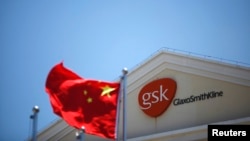BEIJING —
A series of investigations into hospitals and pharmaceutical companies in China has uncovered extensive use of kickbacks and spurred a debate over how to reform the country’s health care system.
The inquiries include the probe targeting Britain’s GlaxoSmithKline drug group and dozens of hospitals in China implicated in a $500 million scheme to bribe officials and doctors to promote sales.
The practices uncovered in the GSK scandal are no surprise to those working in China’s health care system, said Benjamin Shobert, managing director of Rubicon Strategy Group - an organization that advises foreign companies entering the Chinese health care market.
“The question was when one of the big players was going to get caught, and what was going to be the fallout from the government deciding to crack down,” Shobert said.
An open secret
A radiology worker at one Beijing hospital, who wished to remain anonymous, told VOA that so called “commissions” to doctors are a common occurrence.
“The hospital often holds meetings saying that doctors cannot prescribe medicine with commissions, once found they will lay you off, and deduct money,” she said, “But privately nobody is so inflexible.”
A recent survey by the Chinese Medical Association indicates some 54 percent of doctors in China admit to having accepted sales kickbacks from drugs companies.
Media reports have also focused on the impact corruption has on the price of drugs and consumers. GSK executives have been quoted in the media as saying that the cost of financing the bribery scheme led them to mark up drug prices by 20 to 30 percent.
Overpriced drugs
A related probe in the coastal city of Zhangzhou found that most employees working at all of the city's 72 hospitals had accepted bribes. As a result, by some accounts patients were charged 10 times what the hospital paid for a drug.
“This idea that if every drug out there… has this kind of inefficiency built into it, that is an unsustainable inefficiency,” said Shobert. “It needs to go away.”
But analysts believe the only way to stop hospital corruption is to fundamentally change the way health care is financed in China.
A problem born from market reforms?
Before China’s free market reforms started, in the late 1970s, the health care system was largely public and covered almost the entire population.
In its push to liberalize financially onerous sectors of its economy, the government reduced public subsidies to health care in the mid-1980s and allowed hospitals to earn income from services and drugs.
Thirty years later, the government owns and operates over 90 percent of China’s hospitals, but only provides a small percentage of their funding.
“These abuses evolved as a matter of necessity,” said Shobert. “Doctors and hospitals had to find ways to make up shortfalls in funding and reimbursements as an institution. And as an individual, doctors had other ways to capture compensation.”
More state money at stake
For years, Chinese patients shouldered much of the rising costs of the health care system, but that is changing, says Wu Xun, associate professor at the Lee Kuan Yew School of Pubic Policy of the National University of Singapore.
“After 2009 the government has very aggressively pumped in more resources into the health system, mostly to finance the health care scheme,” Wu said.
This has included expanding basic medical coverage to China's rural population as well as a implementing a broader plan for national health care reform.
Wu said that means it’s no longer only the patients shouldering the cost of graft.
“Much of this corruption costs end up with more costs for the government insurance fund,” Wu added.
As the government’s financial stakes in health care grow, analysts believe it will need to make the system more efficient and less corrupt.
Analysts say the government case against GlaxoSmithKline and others implicated in bribery schemes is a necessary first step, but should be followed by more extensive reforms in hospitals' management, funding and accounting.
Shobert said clearer limits on how companies should operate within the sector will be a welcome development for foreign firms that are desperate to grab a share of the China market.
“China is so critical for these pharmaceutical companies in terms of justifying their share price,” he said. “They have to know what the rules are, they have to know how they are going to get enforced and right now, all of those things being thrown in flux, there is a lot of concern about what exactly can we generate from China in terms of profitable and sustainable growth.”
GlaxoSmithKline executives have already apologized to Chinese authorities over the bribery scandal and launched an internal investigation. The firm replaced the head of its China operations this week, and warned the scandal could have some impact on its future performance in the country.
